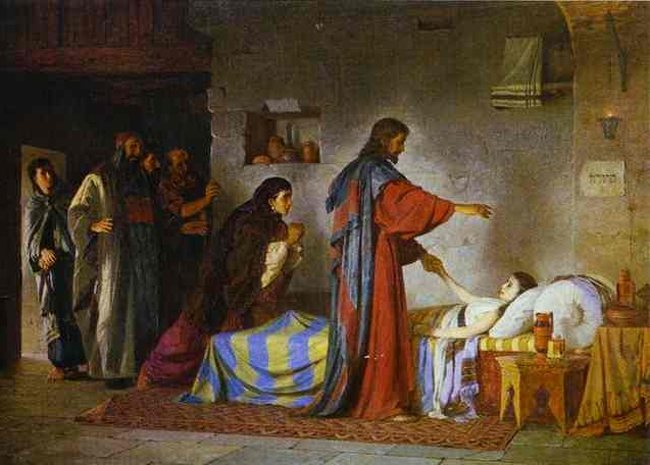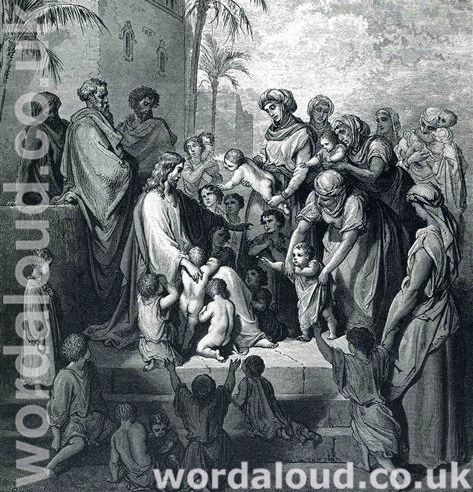Christian Art | Son Of The Father
John 5: 17-30 – Lent Week 4, Wednesday (Audio Bible KJV, Spoken Word)
17 ¶ But Jesus answered them, My Father worketh hitherto, and I work.
18 Therefore the Jews sought the more to kill him, because he not only had broken the sabbath, but said also that God was his Father, making himself equal with God.
19 Then answered Jesus and said unto them, Verily, verily, I say unto you, The Son can do nothing of himself, but what he seeth the Father do: for what things soever he doeth, these also doeth the Son likewise.
20 For the Father loveth the Son, and sheweth him all things that himself doeth: and he will shew him greater works than these, that ye may marvel.
21 For as the Father raiseth up the dead, and quickeneth them; even so the Son quickeneth whom he will.
22 For the Father judgeth no man, but hath committed all judgment unto the Son:
23 That all men should honour the Son, even as they honour the Father. He that honoureth not the Son honoureth not the Father which hath sent him.
24 Verily, verily, I say unto you, He that heareth my word, and believeth on him that sent me, hath everlasting life, and shall not come into condemnation; but is passed from death unto life.
25 Verily, verily, I say unto you, The hour is coming, and now is, when the dead shall hear the voice of the Son of God: and they that hear shall live.
26 For as the Father hath life in himself; so hath he given to the Son to have life in himself;
27 And hath given him authority to execute judgment also, because he is the Son of man.
28 Marvel not at this: for the hour is coming, in the which all that are in the graves shall hear his voice,
29 And shall come forth; they that have done good, unto the resurrection of life; and they that have done evil, unto the resurrection of damnation.
30 I can of mine own self do nothing: as I hear, I judge: and my judgment is just; because I seek not mine own will, but the will of the Father which hath sent me.
Jesus explains certain aspects of the truth of his relationship with his Father. He explains that he is consubstantial with the Father. He is not created as we are; he is the Son; he has life in himself. On earth, Jesus is the mirror of the Father. It is through Christ that we may approach God. God the Father and God the Son share one being. The Father and the Son are equal.
Jesus is clear, therefore, that he has authority, and also that it is for him to judge. While Jesus explains this to us, he also tells us that he is come to save us and to bring us, through the resurrection, to everlasting life. God has become incarnate to bring about our salvation. Our judgement and our salvation are intended by God to be as one.
Christ’s message is for those who most immediately listen to his word, and to us all through all time. Just as God is continually at work upholding creation, so Jesus is with us continually. We look to God the Son for life. When even the dead hear Jesus, how much the more may we listen to his word.
Jesus clearly explains that the judgement and the life to come are at the absolute heart of the reality of our existence. We will be resurrected from the dead, and then we will either enjoy eternal life or suffer damnation. This is truly justice. This is fair. Jesus is not threatening us, as it were like a bully; rather, he is giving himself to us through what he has to say, what he does and what he will do. He desires for us to know the truth he proclaims about who he is and about what we can be.
‘The hour is coming.’ Christ’s judgement is imminent in our lives. Christ is with us now. We have received his testimony and have only to give ourselves up in faith to God and to all that we know is true, to the life of the world to come.
When we rest and recollect ourselves, may we remember the healing Jesus brought on the Sabbath. May we find in our times of silence that we move closer to God. May we sense and embrace God’s presence. He is always here, upholding creation. May we respond to God’s felt presence with love, in thoughts, in our words, and in action.
‘The Divine Word of God the Father (the supreme and only revelation of infinite goodness) deigned to dwell with us in the flesh, humbling himself in a way no words can explain. He said, he did, and he suffered those things which were necessary to reconcile us, while we were yet enemies, with God the Father, and to call us back again to the life of blessedness from which we had been alienated. Not only did he heal our diseases with his miracles, and take away our infirmities by his sufferings, and, though sinless, pay our debt for us by his death like a guilty man. It was also his desire that we should aim to become like himself in love of men and in perfect mutual charity, and he taught us this in many ways.’ St Maximus the Confessor
![]()

Audio Bible KJV | Endnotes
Jesus’ Truth And Judgement | Death, Judgement, Heaven, Hell
One way to approach the topic of death, judgement, heaven, and hell in relation to Jesus as God the Son is to view Jesus as the ultimate expression of God’s love and justice.
The Gospel of John declares that ‘God so loved the world that he gave his one and only Son, that whoever believes in him shall not perish but have eternal life’ (John 3:16, NIV). This passage highlights the idea that Jesus, as God the Son, was sent into the world as a supreme act of love, and that through him, people can attain eternal life. In other words, Jesus offers the promise of salvation and escape from the eternal consequences of sin.
This promise of salvation through faith in Jesus is echoed throughout the New Testament. For example, Paul writes in his letter to the Romans: ‘For the wages of sin is death; but the gift of God is eternal life through Jesus Christ our Lord.’ (Romans 6:23, KJV) Here, Paul emphasizes that eternal life is a gift freely given by God, made possible through the sacrifice of Jesus Christ.
At the same time, Jesus’ divinity also imbues his role as judge with an unparalleled sense of justice. As the Son of God, Jesus possesses perfect knowledge of each person’s actions, thoughts, and intentions. His judgement is not clouded by personal bias or limited by human understanding, but rather it is based on an unerring sense of right and wrong.
The book of Revelation describes the final judgement as a great white throne, with Jesus seated as judge (Revelation 20:11-15). In this scene, those who have accepted Jesus and lived according to his teachings are given eternal life, while those who have rejected him and chosen to live according to their own desires face eternal punishment.
This dual role of Jesus as both saviour and judge is also echoed in the teachings of Christian theologians throughout history. St. Augustine, for example, wrote extensively about the relationship between God’s love and justice, emphasizing that both are necessary for a complete understanding of God’s nature. He wrote: ‘God is both merciful and just. His mercy is shown in saving us, his justice in judging us.’ (Confessions, Book XI, Chapter XII)
Similarly, John Calvin, a prominent Protestant theologian, taught that salvation is only possible through faith in Jesus Christ, but that judgement is ultimately based on a person’s actions. He wrote: ‘It is faith alone which justifies, and yet the faith which justifies is not alone: just as it is the heat alone of the sun which warms the earth, and yet in the sun it is not alone, because it is constantly conjoined with light.’ (Institutes Of The Christian Religion, Book III, Chapter II)
In this way, Jesus as God the Son is both the embodiment of divine love and the ultimate judge of humanity. He offers the promise of salvation to all who believe in him, but he also holds the power to condemn those who reject him. This duality reflects the complex nature of the relationship between humanity and God, and reminds us of the importance of faith and righteous living in preparing for the last things.
In the Christian understanding, Jesus as the Son of God has a unique authority in the judgement of the living and the dead, as he himself says in John 5:27: ‘And hath given him authority to execute judgement also, because he is the Son of man.’ This authority is based not only on his divine nature, but also on his humanity, as he was fully God and fully human. As the Catechism of the Catholic Church affirms: ‘The divine judgement takes place in accordance with what is proclaimed by Jesus in his preaching.’ (CCC 679)
Furthermore, as the one who overcame death through his resurrection, Jesus has the power to grant eternal life to those who have faith in him. He says in John 5:24: ‘Verily, verily, I say unto you, He that heareth my word, and believeth on him that sent me, hath everlasting life, and shall not come into condemnation; but is passed from death unto life.’ This promise of eternal life is a source of hope and comfort for believers, as they trust in Jesus to guide them through the difficult journey of life and into the joys of heaven.
However, the reality of judgement and the possibility of eternal damnation cannot be ignored. As the Catechism states: ‘The teaching of the Church affirms the existence of hell and its eternity.’ (CCC 1035) This is a difficult truth to accept, but it underscores the seriousness of sin and the need for repentance and faith in Christ. As Protestant theologian J.I. Packer writes: ‘The doctrine of hell tells us that sin is worse than we thought, but that grace is greater than we ever imagined.’ (Concise Theology: A Guide to Historic Christian Beliefs)
In light of this, the role of Jesus as judge is not one to be taken lightly. As the Nicene Creed affirms, he will come again in glory to judge the living and the dead, and his kingdom will have no end. It is a reminder of the importance of living a life of faith and virtue, seeking to follow the example of Christ and to grow in holiness through the power of the Holy Spirit.








